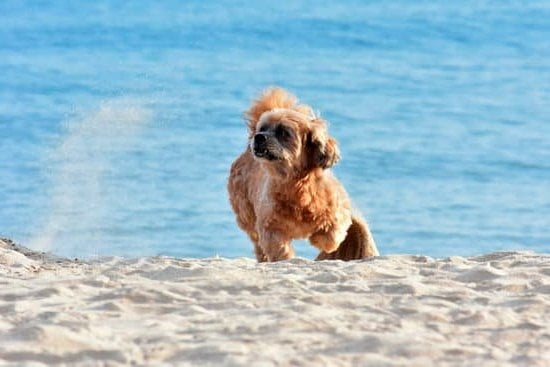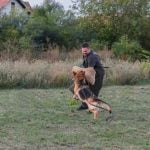Training a duck dog is a crucial aspect of preparing your canine companion for the rewarding yet demanding world of hunting. One of the most common questions among prospective duck dog owners is: what age to train a duck dog? The answer to this question plays a significant role in shaping the success and effectiveness of your training efforts.
Understanding the importance of training a duck dog involves recognizing that it is not just about teaching them skills, but also about developing a strong bond and partnership between you and your furry friend. By starting training at the right age, you set the foundation for a harmonious relationship built on trust, respect, and cooperation.
Different stages of a duck dog’s life determine their readiness for training, with each phase presenting unique challenges and opportunities. Basic obedience training lays down the groundwork for more advanced skills like retrieval and water acclimation. As we delve deeper into the various aspects of duck dog training in the following sections, we will explore how starting at the appropriate age can lead to a successful and fulfilling hunting experience.
Different Stages of a Duck Dog’s Life and Their Readiness for Training
Puppy Stage
During the puppy stage, typically between 8 to 16 weeks of age, duck dogs are like sponges, absorbing information and forming habits. It is crucial to start basic obedience training during this stage as it sets the foundation for more advanced training later on. This is a great time to introduce commands such as sit, stay, and come. It is essential to keep training sessions short and fun, considering the short attention span of puppies.
Adolescent Stage
As duck dogs enter the adolescent stage around 16 weeks to 6 months of age, they become more independent but also test boundaries. This can be a challenging time for training as they may exhibit more stubborn behavior.
It is important to continue reinforcing basic obedience commands during this stage and gradually introduce more advanced training techniques such as retrieval skills and water acclimation. Consistency and positive reinforcement are key in overcoming any behavioral challenges that may arise during this period.
Young Adult Stage
Between 6 months to a year old, duck dogs reach young adult stage where they have more physical capabilities and mental maturity. This is an ideal time to focus on socialization and exposure to the hunting environment. Duck dogs should be gradually introduced to gunfire, decoys, boats, and other elements commonly encountered during duck hunting.
Advanced training techniques can be implemented at this stage to enhance their skills further. The right age for training a duck dog ultimately depends on individual readiness and development milestones reached by each dog.
Basic Obedience Training for Duck Dogs
Training a duck dog in the foundational obedience commands of sit, stay, and come is crucial to preparing them for a successful hunting companion. These basic commands not only help establish discipline and respect between you and your dog but also ensure their safety in various hunting scenarios.
When considering what age to train a duck dog in these basic obedience skills, it’s important to start as early as possible. Most experts recommend beginning training as young as 8-10 weeks old when the puppy’s cognitive abilities are developing rapidly.
During the early stages of training, focus on short, frequent training sessions to keep your duck dog engaged and attentive. Use positive reinforcement techniques such as treats, praise, and playtime to create a positive association with obeying commands. Consistency is key when teaching sit, stay, and come, so be patient and persistent with your training efforts. Remember that each dog is unique in their learning pace, so adjust your approach based on your duck dog’s progress and behavior.
As your duck dog begins to grasp the basic obedience commands, gradually increase the difficulty of distractions in the training environment. Practice these commands in various settings such as parks, fields, or near water bodies to simulate real hunting situations.
This exposure helps prepare your duck dog for the unpredictable nature of hunting expeditions where they need to respond promptly to your cues amidst potential distractions. By starting obedience training at a young age and building a strong foundation of basic commands, you set your duck dog up for success in their future hunting endeavors.
| Age | Training Milestone |
|---|---|
| 8-10 weeks | Start basic obedience training (sit, stay, come) |
| 3-4 months | Gradually increase distractions during training sessions |
| 6 months | Transition into more advanced hunting skills training |
Introducing Duck-Specific Training
When considering what age to train a duck dog, it is essential to understand the significance of introducing duck-specific training at the right stage of their development. Duck dogs go through different stages in their life, and each stage can impact their readiness for training.
Typically, experts recommend starting basic obedience training for duck dogs as early as 8 weeks old to establish good behaviors and commands. As the duck dog grows, around 6 months old, they are ready for more specialized training focused on retrieving skills and water acclimation.
To ensure that your duck dog is adequately prepared for hunting expeditions, introducing retrieval skills is crucial. Teaching them how to retrieve and deliver ducks gently without damaging the game is essential for a successful hunt. Here are some key aspects to consider during this phase of training:
- Practice short retrieves on land before transitioning to water
- Use dummy ducks or bumpers to simulate real-life hunting scenarios
- Reinforce positive behavior with treats and praise
In addition to retrieval skills, water acclimation is another vital component of duck-specific training. Duck dogs need to feel comfortable in various water environments, including ponds, lakes, or marshes. This phase of training can help them develop the necessary swimming skills and confidence to retrieve ducks from different bodies of water effectively.
- Gradually introduce your duck dog to shallow water first
- Encourage them to swim by using toys or treats as motivation
- Teach them how to enter and exit the water safely
By incorporating these key elements into your duck dog’s training regimen at the right age, you can help build a strong foundation for a successful hunting partner. Properly trained duck dogs not only enhance your hunting experience but also strengthen the bond between you and your loyal companion.
Socialization and Exposure to Hunting Environment
Socialization and exposure to the hunting environment are crucial aspects of training a duck dog. It is essential to start this process at a young age to ensure that the dog becomes comfortable with different surroundings, sounds, and situations commonly encountered during hunting trips. Introducing your duck dog to the sights and sounds of the outdoors early on can help build their confidence and reduce anxiety when out in the field.
Young duck dogs should be gradually exposed to the hunting environment, including fields, bodies of water, boats, decoys, gunshots, and other elements they will encounter while on a hunt. This exposure should be done in a controlled manner to prevent overwhelming the dog. Positive reinforcement techniques can be used during these sessions to associate these experiences with rewards, reinforcing good behavior in new environments.
Proper socialization and exposure at a young age can help prevent fear or aggression towards unfamiliar stimuli later in life. By gradually introducing your duck dog to different hunting scenarios and environments, you are setting them up for success as they mature and begin actively participating in hunts. Starting this training early on can lead to a well-rounded and confident hunting companion that is eager to work alongside you in the field.
| Training Aspect | Importance |
|---|---|
| Socialization | Prevents fear or aggression towards unfamiliar stimuli |
| Positive reinforcement | Associates new experiences with rewards |
Advanced Training Techniques for Duck Hunting Success
Once your duck dog has mastered the basic obedience commands and duck-specific training, it’s time to move on to advanced techniques that will further enhance their skills for a successful hunting season. Advanced training includes refining retrieving skills, developing steadiness in the blind, and improving marking abilities. These techniques will not only make your duck dog a more efficient hunter but also strengthen the bond between you and your canine companion.
One important aspect of advanced training for duck dogs is teaching them to handle multiple retrieves and blinds. This involves sending your dog on multiple retrieves in succession, as well as directing them to specific locations to retrieve downed birds. This skill is crucial during actual hunting scenarios where there may be multiple birds downed at different locations. By practicing these drills, your duck dog will become more proficient at handling complex hunting situations.
Another key element of advanced training for duck dogs is introducing distractions and diversions during retrieving exercises. This can include using decoys, gunshots, or other stimuli to mimic real hunting environments.
By exposing your dog to these distractions during training, they will learn to focus on the task at hand and ignore external factors that could potentially affect their performance in the field. Consistent practice and reinforcement of these advanced techniques will help ensure that your duck dog is well-prepared for a successful hunting season.
Common Mistakes to Avoid During Duck Dog Training
Skipping Basic Obedience Training
One common mistake that many duck dog owners make is skipping basic obedience training. It is essential to establish a strong foundation of obedience before moving on to more advanced training techniques.
Teaching your duck dog commands like sit, stay, and come not only ensures better communication between you and your companion but also creates a disciplined and well-behaved hunting partner. Without proper obedience training, it can be challenging to control your duck dog in the field, leading to frustration for both you and your canine companion.
Using Negative Reinforcement
Another mistake to avoid during duck dog training is using negative reinforcement. Punishing your duck dog for mistakes or undesired behaviors can have detrimental effects on their motivation and overall performance.
Instead of focusing on what they did wrong, it is crucial to redirect their behavior positively and reinforce good behavior with rewards like treats or praise. Positive reinforcement has been proven to be more effective in training dogs and helps build a stronger bond between you and your furry friend.
Rushing Through Training Processes
One of the most significant mistakes that duck dog owners make is rushing through the training processes. Every dog is unique and may require different timelines to grasp certain commands or skills. Patience is key when training a duck dog, especially when introducing them to new tasks or environments.
Rushing through training can lead to confusion for your canine companion and may result in incomplete or inconsistent learning. Taking the time to properly train your duck dog at their own pace will ensure a solid foundation for successful hunting experiences in the future.
By avoiding these common mistakes during duck dog training, you will set your four-legged partner up for success in the field. Remember that each step of the training process is crucial in building a reliable hunting companion, so take the time to train consistently, use positive reinforcement techniques, and tailor the training approach to meet your duck dog’s individual needs.
With patience, dedication, and proper guidance, you can create a strong bond with your duck dog and enjoy many successful hunting seasons together.
The Benefits of Starting Training at the Right Age
Training a duck dog is a rewarding and fulfilling journey that requires patience, consistency, and proper guidance. One of the key factors that can significantly impact the success of training a duck dog is starting at the right age. Many aspiring hunters often wonder, “What age to train a duck dog?” The answer to this question can vary depending on the breed of the dog, but generally speaking, experts recommend starting basic obedience training as early as 8 weeks old.
When it comes to training a duck dog, early socialization and exposure to various environments are crucial for their development. Here are some benefits of starting training at the right age:
1. Improved Learning Ability: Young dogs are like sponges, eager to soak up new information and experiences. Starting training at a young age can help them grasp commands more quickly and effectively.
2. Establishing Good Habits: By introducing basic obedience commands early on, you can instill good behaviors in your duck dog from the start. This sets a strong foundation for more advanced training down the line.
3. Building Trust and Bonding: Training your duck dog from a young age allows you to establish a strong bond based on trust and communication. This bond is essential for successful hunting partnerships.
Starting training at the right age not only sets your duck dog up for success in hunting but also helps cultivate a lifelong relationship based on mutual respect and understanding between you and your canine companion. Remember, consistency, patience, and positive reinforcement are key components of effective training at any age.
Conclusion
Training a duck dog is a crucial part of preparing them for a successful hunting season. Starting at the right age is essential to ensure that they develop the necessary skills and behaviors to excel in the field. While each dog is unique, it is generally recommended to begin training around 6-12 months of age when they have developed mentally and physically enough to understand and retain commands effectively.
By focusing on basic obedience training such as sit, stay, and come commands early on, you can establish a strong foundation for more advanced skills later. Introducing duck-specific training like retrieval skills and water acclimation at the right age helps the dog become comfortable with tasks they will encounter while hunting. Socialization and exposure to the hunting environment are also key factors in shaping a well-rounded duck dog that can perform confidently in various situations.
Starting training at the appropriate age not only sets your duck dog up for success in the field but also strengthens the bond between you as their handler. Consistent training, patience, and positive reinforcement are vital components of a successful training program.
Remember that every dog learns at its own pace, so be patient and tailor your approach to their individual needs. With proper training at the right age, you can watch your duck dog grow into a reliable hunting partner that brings enjoyment and success to your hunting experiences.
Frequently Asked Questions
When Should You Start Training a Hunting Dog?
You should start training a hunting dog as early as possible, ideally when they are still puppies. This is because young dogs are more receptive to learning new skills and behaviors. Starting early also helps establish a strong foundation for their hunting training.
How Many Hours a Week Should I Train My Duck Dog?
The number of hours you should train your duck dog per week can vary depending on the individual dog and their progress. Generally, it is recommended to train consistently for at least 2-3 hours per week. However, quality training sessions are more important than quantity.
What Is the Best Age to Start Training a Gun Dog?
The best age to start training a gun dog is around 6-8 weeks old. This is when puppies start to develop socialization skills and basic obedience commands can be introduced. It’s important not to overwhelm them with too much training too soon, but rather focus on gradual and positive reinforcement techniques.

Welcome to the blog! I am a professional dog trainer and have been working with dogs for many years. In this blog, I will be discussing various topics related to dog training, including tips, tricks, and advice. I hope you find this information helpful and informative. Thanks for reading!





